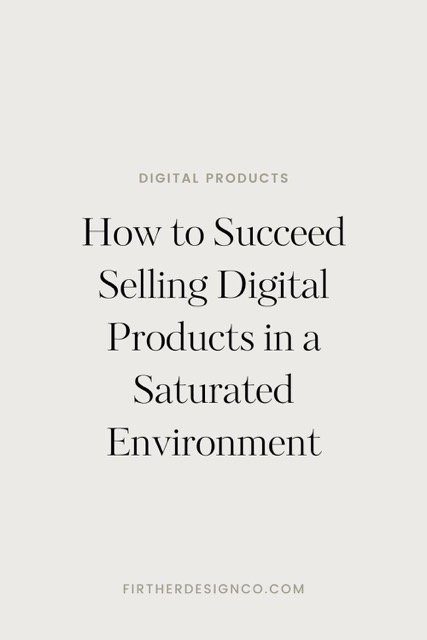How to Succeed Selling Digital Products in a Saturated Environment
You’ve probably seen the videos.
All you need is Canva and 10 minutes and you can make thousands of dollars per month in passive income. Anyone can do it!
This is the tale often told about selling digital products in the clickbait style videos spread all over TikTok and YouTube. And it’s true: anyone can do it. A lot of people ARE doing it. Which kind of makes you wonder:
Is the market too saturated with digital products for me to achieve success? I’m not even sure it’s worth pursuing.
The answer to that? Nope! The market is wide open with opportunities.
It’s true that are a lot of options available and many people have digital product storefronts, but that doesn’t mean you should be discouraged. Think of a T-Shirt for example. Target sells them. Walmart sells them. Luxury stores sell them. Each one is a little different, fits in its own way, comes in at a certain price point, and meets the needs of the buyer.
In this post I’m going to share a few actionable tactics you can use to succeed at selling digital products online. Let’s dive in!
Lesson 1: A successful digital product solves a specific and unique problem
If you go on Etsy and search digital products, you’ll come across tons of basic stuff that anyone with Google Docs could create. Things like checklists, calendars, and grocery lists. Anyone can easily create them, therefore many people do create them, which in turn creates a lot of competition. The high competition creates a bit of a price war and you’ll see some of these products selling for as low as $1.
But the more specific products for a niche audience? Not everyone can make those. Not everyone has the unique skillset or POV to cater to certain audiences. Products that solve a very specific problem for a very specific audience are a lot more valuable to buyers and not only perform better, but you can also charge more.
This is referred to as finding a niche.
One way to make a digital product for a niche market is to identify a specific problem or need within the niche that the product can address. This could involve conducting market research, gathering feedback from past customers, or analyzing competitors to understand what sets the digital product apart and makes it valuable.
Once you’ve established the product's value proposition, it's important to design and develop the product with the specific needs and preferences of the niche market in mind. This can involve customizing the content, incorporating special features, or tailoring the product's messaging and branding to appeal to the target audience.
Lesson 2: Find your point of differentiation
In the book Purple Cow by Seth Godin, he talks about the idea of being remarkable. The idea boils down to finding out the thing you do that sets you apart from all the rest.
Take Zappos for example. They sell shoes. Lots of places sell shoes: Nike, Adidas, Nordstrom, DSW, Target…literally thousands of places sell shoes. But Zappos doesn’t just sell shoes. They have amazing customer service.
In fact, they have said that they’re a “service company that happens to sell shoes.” They offer 365 day returns and go above and beyond with customer service that is available 24/7. Their quality of customer service is a point of differentiation that separates them from all of their competitors. And that’s enough to inch someone to buy from Zappos vs. any other retailer.
Think about your skillsets and what you bring to the table.
What can you do or provide to customers that goes above and beyond anyone in your space?
Are you faster or more effective than your competitors?
Do you offer more support or resources to customers?
Do you have a better customer experience or design?
That is what will make you stand out.
Lesson 3: Leverage your brand
Some people may think branding is just aesthetics, but it’s much more than that. People like to buy from people they trust and your brand is a big part in that: from how you show up online to how your brand looks. Branding helps to establish trust, credibility, differentiation, and emotional connection with potential customers, which can all help you differentiate yourself from your competitors.
That’s why some people are Coca-Cola people and some people are Pepsi people. Taste is a factor in which soda you drink, but so is branding!
A strong brand helps establish trust and credibility with potential customers, which can make them more likely to choose your product or service over those of your competitors. This is because a well-known and respected brand is often seen as a symbol of quality and reliability.
Second, a clear and consistent brand message can help to differentiate your product or service from those of your competitors, which can make it more attractive to potential customers. A unique and compelling brand message is key in helping capture the attention of potential customers and make them more interested in what you have to offer.
When your brand is well-designed, it can help to create an emotional connection with potential customers. This is because a strong brand will often have a visual and/or emotional element that resonates with people and makes them feel a certain way about the product or service being offered.
Lesson 4: Know who you’re talking to
If you know your audience, you’ll be able to empathize with them and truly understand what they need and where they are experiencing pain points. Not only will this allow you to tailor your digital product to their needs (like we talked about above), it will also help you tailor your marketing messaging and website copy to them.
For example, if you know your audience is strapped for time, you can show them how fast they’ll be able to get results and spell out that benefit on the product page.
Effective marketing and promotion playa a major role in the success of a digital product. Targeting the right audience, using compelling messaging and imagery, and showcasing the product's value proposition in a clear and concise manner are all great ways to rise to the top of your niche.
In order to truly stand out and succeed in the competitive digital landscape, a product should be able to effectively communicate its value to potential users and convince them to try it out.
Conclusion: How to Succeed Selling Digital Products in a Saturated Environment
Selling digital products is a great way to add an additional stream of income to your business so it’s important to know what to look out for before you dive in. With these tips, you’ll be well on your way to creating a digital product that stands out from the competition (and most importantly) solves a problem effectively for your audience. One of the best things about digital products is they can deliver results immediately, which is a huge selling point to draw in your audience. What are your questions about coming up with a successful digital product to sell?
If you’re interested in digital products, you may find these other articles on my site helpful:





